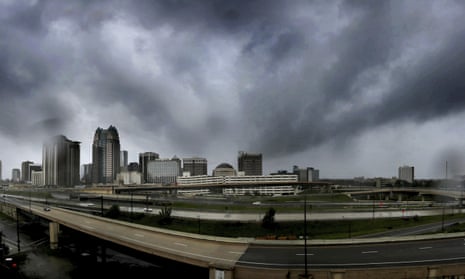Recent days have seen Houston, Texas literally sunk under sheer weight of rain, Carribbean islands battered by powerful storms barrelling across the Gulf and now Florida homes blasted by Irma, the largest of three hurricanes churning in the Atlantic basin. It seems almost certain that man-made climate change has a role in such events. Scientists used to be circumspect at attributing any single extreme event to global warming. No longer. Now scientists make the link between climate change and droughts in Kenya, record winter sun in Britain and torrential downpours in south-west China.
The unmistakeable fingerprint of extreme weather at the crime scene of global warming seems intuitively obvious: consider that Houston is reckoned to have been hit by three “500-year floods” in three years. A 500-year flood does not have to happen only twice a millennium. But a run of three indicates that past climate is no longer a reliable guide to the present weather. The explanation is that the climate itself is changing.
Such thinking should be a wake up call for the world, which has to understand how profoundly we must make a shift in the way we produce, distribute and consume energy, and how disruptive this will be for the real economy. While governments have, via the Paris agreement, signalled the end of the fossil-fuel era, the political processes by which states will decide how to meet their mitigation targets have been hijacked and influenced by Big Carbon.
Fossil-fuel companies, hydrocarbon billionaires and their allies, particularly in the west, have for years now been funding a massive and sophisticated campaign to mislead voters about the environmental harm caused by carbon pollution. They have good reason to: a landmark study released earlier this year revealed 50 corporations account for more than one-fifth of all carbon released into the atmosphere since the industrial revolution began. The groundbreaking research not only helps establish legal accountability for climate change, it also weakens any corporate defence of wilful blindness. A major polluter cannot say it was going ahead with its activities because it was unaware its products caused great harm. Corporations have made handsome profits as the globe ended up a degree warmer than it should be. These polluters privatised the fossil-fuel profits and socialised the cost to the world’s poor, global taxpayers and future generations. Big Carbon entities and individuals who claim their lobbying activities are just an expression of their democratic rights sound a lot like Big Tobacco when it was denying the health dangers of smoking.
Three major legal actions will test such thinking. First in the Philippines, where it is being determined whether polluters violated the human rights of Filipinos for their role in creating the conditions for Typhoon Haiyan, the strongest ever tropical storm to make landfall, which left more than 7,000 dead. Second in Germany, where a German utility company is being sued for costs associated with glacial lake flooding in Peru. Last in the US, where two California counties are suing 37 oil, gas and coal companies, claiming they knew their products would cause sea-level rise and coastal flooding, but failed to reduce their greenhouse gases.
Fossil-fuel companies should be held accountable for the effects of climate change. Legal warfare has a two-fold aim: to overhaul transgressors’ business models so that they are in line with the global commitment to phase out fossil fuels and limit temperature rises to 1.5°C; and to get them to pay for damages resulting from global warming. Climate litigation is the inevitable result of a failure of two decades of talks. But it is also an important way of reframing the climate crisis as a human rights emergency.








